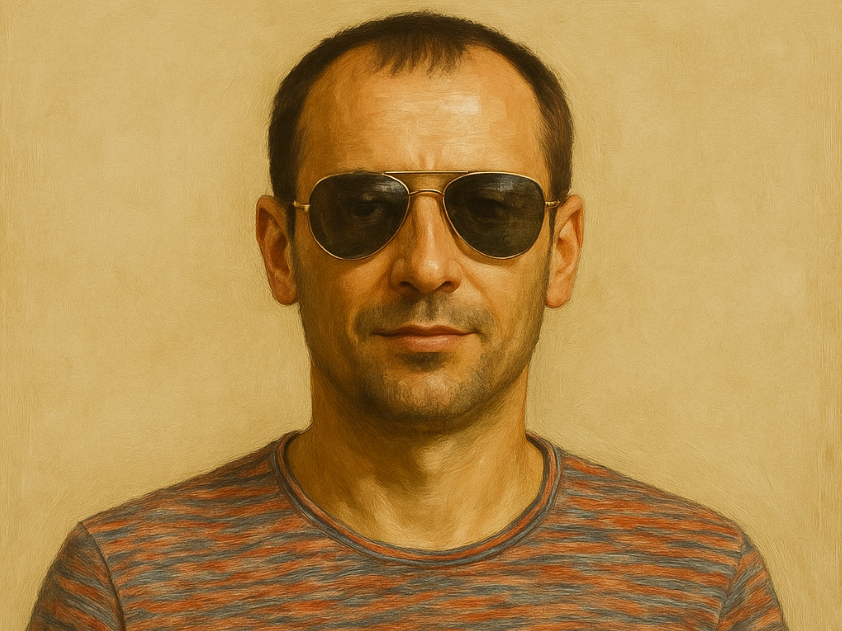
Gender Zed redefines what it means to be visible in Ukraine’s embattled south.
It starts in a basement.
Not metaphorically— but in an actual basement, tucked below a modest building in Zaporizhzhia, less than an hour from the frontline. The walls are lined with supplies, a mattress leaning against one wall. There are documents, cables and lights. In the corner: a psychologist sits on a fold-out chair listening to someone whose life has been upended.
During the worst months of the war, the team slept down here. With their families. Their dogs. As missiles fell above the city, the basement became not just a workplace, but a sanctuary. “It was safer than most apartments,” says Oleksandr Vytvitskyi. “And the psychologist still kept seeing people.”
This is what remains of a dream that began fifteen years earlier—one that has shapeshifted with every national crisis.
But Gender Zed didn’t start in a basement. It began as a loose initiative in 2008, launched by a few people who wanted to make life a little more liveable for LGBTQI+ Ukrainians in the country’s more conservative south. They organised discussion groups, trained teachers, talked to police officers. In 2020, they helped stage Zaporizhzhia’s first Pride march—the kind of visibility moment that signals not just courage, but capacity.
And then came February 2022.
“We weren’t an emergency relief organisation,” Vytvitskyi says. “But suddenly, we were the people being called when someone needed insulin. Or shelter. Or a way out.”
That pivot—from advocacy to survival logistics—didn’t come with a training manual. But speed, he insists, is their superpower. “We don’t do bureaucracy,” he says. “If something needs to be done, we just do it.”
The community centre—once a space for workshops, movie nights, support circles—became a depot, a nerve centre, a bunker. The team shrank from 15 to 8, scattered across cities. Some couldn’t leave Zaporizhzhia. Others fled to safer towns, like Kropyvnytskyi. The work continued in fragments.
The pandemic had already nudged them online. During lockdowns, Gender Zed started experimenting with video content. A YouTube channel took shape. They began producing short-form segments, some about rights, others about identity, some about nothing at all except the ordinary joy of being visible. “It wasn’t just for LGBTQI+ people,” Vytvitskyi says. “It was for anyone who needed to see that we’re still here.”
Now, with over 100,000 subscribers, the channel has become both a platform and a revenue stream—albeit a modest one. “Thanks to EED, we’ve been able to continue our regular shows on YouTube. And we’ll be holding a strategic planning session this summer, which is critical.”
The word critical comes up often in conversation, and it’s never about content. It’s about salaries, rent, continuity. Gone are the days of two-year funding cycles. These days, projects are six, maybe eight months. Short runway, long road.
And yet, they persist.
They’ve adapted again, shifting from direct service to capacity-building. They train teachers, NGO staff, even civil servants who can integrate LGBTQI+ inclusion into their own work. “It’s more scalable,” says Vytvitskyi. “We can’t be everywhere. But they can.”
The centre in Zaporizhzhia, though, remains sacred. Not for symbolism, but for what it holds—equipment, archives, quiet space for consultations. “We can’t just take sensitive documents home,” he says. “And people still need that in-person care.”
The community they serve has changed too. Before the war, it was mostly young activists, openly queer, eager to organise. Now, the community is less visible. Some have joined the army. Some have fled. Many are still in the region but watch silently, anonymously, from their phones.
“We don’t do public events anymore,” Vytvitskyi says. “But we know they’re there. Watching. Listening.”
There’s something deeply post-heroic about Gender Zed’s resilience. It isn’t flashy. There are no sweeping declarations. Just routines under duress. Content is produced from multiple cities. A staff that checks in. A basement that keeps the lights on.
Vytvitskyi resists the language of exceptionalism. He names the people at Kharkiv Pride, at Kyiv Pride—those who still stage public events during wartime—as his heroes. “It’s important we don’t roll back,” he says. “That we don’t become like Russia, where LGBTQI+ rights are erased. Public presence still matters.”
It does. But sometimes, presence is redefined. It isn’t about flags or crowds or city squares. It’s about continuity. About showing up every day in the comment section, in a message thread, in the steady release of one more video.
Gender Zed may not be marching, but they are still moving—quietly, steadily—through a country that needs them to keep existing out loud.
This article reflects the views of the grantees featured and does not necessarily represent the official opinion of the EED.
This initiative was supported thanks to the contribution of the European Commission to EED.